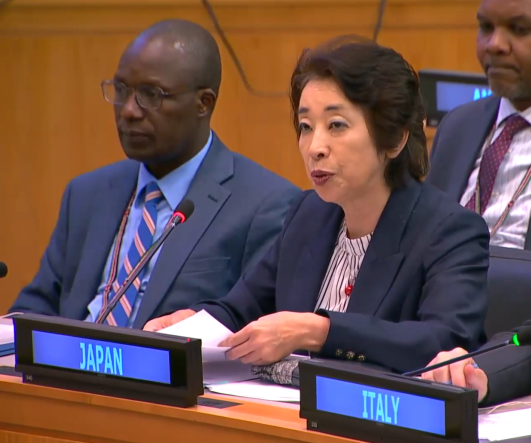Statement by H.E. Ambassador SHINO Mitsuko, Deputy Permanent Representative of Japan to the United Nations, at the Peacebuilding Commission (PBC) Ambassadorial Level Meeting on the activities of the Peacebuilding Fund (PBF)
2024/9/19

Thank you, Mr. Chair.
Thank you for convening this meeting. I would also like to express support for the Peacebuilding Support Office’s (PBSO) initiative to review the terms of reference (TOR), as requested of the Secretary-General (SG) in the General Assembly (GA) Resolution 78/257. I also thank ASG Spehar for her briefing.
Sustainable peace can be achieved by comprehensively addressing context-specific root causes while respecting national ownership. The Peacebuilding Fund (PBF) is a first resort to this end, through its unique characteristics to enable an integrated UN response across pillars, with each actor leveraging their expertise. Based on this understanding, Japan has contributed over 65 million USD to the PBF since its establishment in 2006. In addition to the 3.7 million USD apportioned this year, we have just decided to provide further approximately 359,000 USD.
We, the Member States, recognizing the importance of ensuring adequate, predictable, and sustained financing for peacebuilding, unanimously adopted the GA Resolution 78/257 in December last year. We had held comprehensive discussions in the Fifth Committee to reach this consensus. We look forward to seeing the effective use of assessed contributions alongside voluntary contributions. To rightly reflect the spirit of our consensus, Japan joins others in emphasizing the need for a "technical update" approach, and I would like to highlight three important aspects that Japan attaches importance throughout this review.
First, the importance of sustaining peace, as advocated in the twin resolutions of the 2016 Peacebuilding Architecture Review, must be incorporated to the new TOR. Efforts that utilize PBF, including those using assessed contributions, should aim to establish a solid foundation of resilience that helps prevent any relapse into conflict and sustains peace.
Second, the new TOR should clearly articulate that voluntary contributions remain the primary source of funding. Assessed contributions are not intended to replace voluntary contributions, innovative funding, or funding in cooperation with International Financial Institutions (IFIs), which should all continue to be pursued. Each type of funding has its unique strengths and should be wisely allocated based on the appropriate context.
Third, the new TOR should guarantee a certain level of oversight for assessed contributions, which must be achieved without compromising the PBF’s agility, flexibility, risk tolerance, or respect for national ownership. In this regard, Japan stresses the importance of the Secretary-General’s annual reporting on allocations, performance, impact, and management of the assessed contributions and the role of the PBF Advisory Group. Japan welcomes continued communications between this Advisory Group and the PBC. These practices are also critical to enhance the visibility of the PBF’s effectiveness and attract further engagements.
Mr. Chair,
Japan reiterates that the most useful quality of the PBF funding lies in its catalytic nature in providing seed funding that can attract additional contributions from donors, other UN agencies, IFIs, or the private sector. We should leverage this catalytic feature, to make the PBF contribution sustained.
Additionally, we must strengthen UN system-wide coherence across all relevant activities conducted by various entities, including Peacekeeping Operations, Special Political Missions, and Agencies, Funds, and Programmes. When all these actors collaborate both on the ground and at Headquarters, peacebuilding efforts can become truly comprehensive.
In conclusion, I would like to reaffirm Japan's full commitment to advancing the peacebuilding and sustaining peace agenda.
I thank you.
